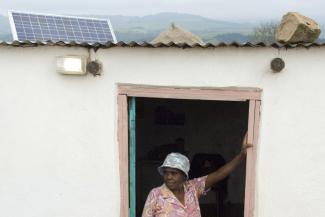Energy supply
Great need – great potential

Fortunately, the number of energy-related private-sector investments has increased fast in the past decade. Obviously, governments welcome this trend. German companies are not involved much however. Most investors are from North America and China, Liebing reckons. The Chinese are estimated to account for the most projects.
“Germans do not invest much yet,” says Judith Helfmann-Hundack of Afrika-Verein, which hosted the 9th German-African Energy Forum in Hamburg in May. Many participants pointed out that there is interest in investing, but that many managers are uncomfortable with the business climate in Africa. They feel that the regulatory context must improve and the rule of law must be guaranteed. Wide-spread corruption, for instance, is a disincentive to invest. German companies want African governments to provide a more trustworthy environment, and they are also interested in export credit guarantees from Germany’s Federal Government.
African leaders are aware of the challenges. For instance, South Africa and Ghana are already providing financing guarantees to foreign investors. On the other hand, many Africans insist that the German perception is distorted. Ezekiel Adesina, a Nigerian business analyst, says that European companies should not rely only on the assessments of rating agencies, but need to develop an understanding of African markets.
By 2040 the continent’s economy will quadruple, its population is estimated to nearly double, and its energy demand will grow by 80 %. In order to meet the demand, Africa’s energy infrastructure must improve and become more diverse. That is the assessment of Stefan Steinlein, state secretary at Germany’s Foreign Office. He points out that Germany’s expertise in renewable-energy technology will be essential. Renewables have high upfront costs, but they are decreasing. Experts reckon that power from renewable sources will not cost more than power from conventional sources for long.
Thembani Bukula of NERSA (National Energy Regulator of South Africa) points out that renewable options are important in view of climate change. He adds that Africa has a great potential for solar and hydro power.
However, African governments want reliable and cheap energy fast. They argue that West Germany’s economic miracle in the 1950s was based on such options. They worry that wind and solar power depend on weather and daytime. Accordingly, many of them have a preference for conventional approaches. Experts agree that countries need to find an appropriate mix of technologies that suit their needs.
“Africa is emerging as an energy market,” states Rainer Baake, state secretary of the Federal Ministry for Economic Affairs and Energy. In his view, it is time for the international community to help create a sustainable and reliable energy sector on the continent. Industrialisation must drive economic growth to improve standards of life in Africa, and that cannot happen unless the energy sector is developed. As Liebing, the Afrika-Verein chairman, summarises: there will be “no jobs without industrialisation, and no industrialisation without energy”.
Rebecca Renz






